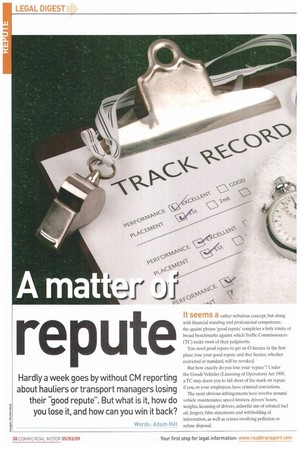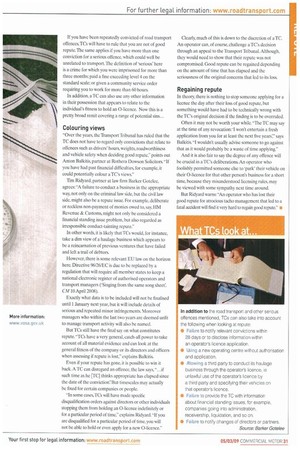Hardly a week goes by without CM reporting about hauliers
Page 30

Page 31

If you've noticed an error in this article please click here to report it so we can fix it.
or transport managers losing their "good repute". But what is it, how do you lose it, and how can you win it back?
Words: Adam Hilt It seems a rather nebulous concept, but along with financial standing and professional competence, the quaint phrase 'good repute' completes a holy trinity of broad benchmarks against which Traffic Commissioners (TC) make most of their judgments.
You need good repute to get an 0-licence in the first place: lose your good repute and that licence, whether restricted or standard, will be revoked.
But how exactly do you lose your 'repute'? Linder the Goods Vehicles (Licensing of Operators) Act 1995, a TC may deem you to fall short of the mark on repute if you, or your employees, have criminal convictions.
The most obvious infringements here revolve around vehicle maintenance, speed limiters, drivers' hours, weights, licensing of drivers, unlawful use of rebated fuel oil, forgery, false statements and withholding of information, as well as crimes involving pollution or refuse disposal. If you have been repeatedly convicted of road transport offences.TCs will have to rule that you are not of good repute. The same applies if you have more than one conviction for a serious offence, which could well be unrelated to transport. The definition of 'serious' here is a crime for which you were imprisoned for more than three months; paid a fine exceeding level 4 on the standard scale: or given a community service order requiring you to work for more than 60 hours.
In addition, a TC can also use any other information in their possession that appears to relate to the individual's fitness to hold an 0-licence. Now this is a pretty broad remit covering a range of potential sins...
Colouring views
"Over the years, the Transport Tribunal has ruled that the TC does not have to regard only convictions that relate to offences such as drivers' hours, weights, roadworthiness and vehicle safety when deciding good repute," points out Anton Balkitis, partner at Rothera Dowson Solicitors. "If you have had past financial difficulties, for example, it could potentially colour a TC's views."
Tim Ridyard, partner at law firm Barker Gotelee, agrees: "A failure to conduct a business in the appropriate way, not only on the criminal law side, but the civil law side, might also be a repute issue. For example. deliberate or reckless non-payment of monies owed to, say, 1-IM Revenue & customs, might not only be considered a financial standing issue problem, hut also regarded as irresponsible conduct-tainting repute."
In other words, it is likely that TCs would, for instance, take a dim view of a haulage business which appears to be a reincarnation of previous ventures that have failed and left a trail of debtors.
However, there is some relevant EU law on the horizon here. Directive 96/26/EC is due to he replaced by a regulation that will require all member states to keep a national electronic register of authorised operators and transport managers ('Singing from the same song sheet', CM 10 April 2008).
Exactly what data is to be included will not be finalised until 1 January next year, but it will include details of serious and repeated minor infringements. Moreover managers who within the last two years are deemed unfit to manage transport activity will also be named.
But TCs still have the final say on what constitutes repute. "TCs have a very general, catch-all power to take account of all material evidence and can look at the general fitness of the company or its directors and officers when assessing if repute is lost," explains Balkitis.
Even if your repute has gone, it is possible to win it back. A TC can disregard an offence, the law says,".. .if such time as he ETC] thinks appropriate has elapsed since the date of the conviction'.' But timescales may actually be fixed for certain companies or people.
"In some cases,TCs will have made specific disqualification orders against directors or other individuals stopping them from holding an 0-licence indefinitely or for a particular period of time," explains Ridyard. "if you are disqualified for a particular period of time, you will not be able to hold or even apply for a new 0-licence." Clearly, much of this is down to the discretion of a TC An operator can, of course, challenge a TC's decision through an appeal to the Transport Tribunal. Although. they would need to show that their repute was not compromised. Good repute can be regained depending on the amount of time that has elapsed and the seriousness of the original concerns that led to its loss.
Regaining repute
In theory, there is nothing to stop someone applying for a licence the day after their loss of good repute, hut something would have had to be technically wrong with the TC's original decision if the finding is to be overruled.
Often it may not be worth your while. "The TC may say at the time of any revocation: 'I won't entertain a fresh application from you for at least the next five years'," says Balkitis. "I wouldn't usually advise someone to go against that as it would probably be a waste of time applying."
And it is also fair to say the degree of any offence will be crucial in a TC's deliberations. An operator who foolishly permitted someone else to 'park' their vehicle on their 0-licence for that other person's business for a short time, because they misunderstood licensing rules, may be viewed with some sympathy next time around.
But Ridyard warns: "An operator who has lost their good repute for atrocious tacho management that led to a fatal accident will find it very hard to regain good repute.•
















































































































































